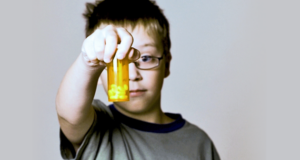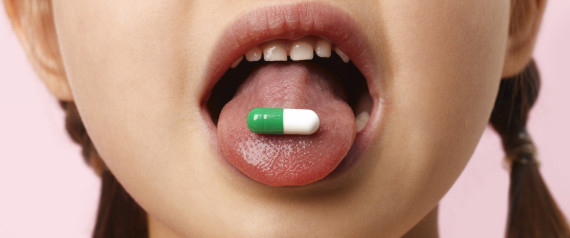The controversy surrounding the medication of children diagnosed with ADD/ADHD has taken a new twist: doctors prescribing drugs for children who are having trouble in school, but not necessarily diagnosed with any disorder.
In his 2012 article for the New York Times titled “Attention Disorder or Not, Pills to Help in School,”
Alan Schwartz reports on the new phenomenon. Included is not only anecdotal evidence of doctors prescribing drugs for what amounts to a diagnosis of ‘bad grades,’ but also parents self-medicating their children.
One can only wonder if this may aid the continuation of the known trend of recreational abuse of these stimulants among teenagers and young adults.
Square Peg, Round Hole

(from austinalcoholtreatment.org)
Dr. Michael Anderson, a pediatrician near Atlanta, gets a spotlight for this piece. In the article he even goes as far as suggesting that ADD/ADHD are not real conditions, but rather functions of our one-size-fits-all society that leaves behind people who are not built to succeed within the parameters of common standards.
“I don’t have a whole lot of choice,” he said. “We’ve decided as a society that it’s too expensive to modify the kid’s environment. So we have to modify the kid.”
There is some evidence to suggest that this idea is gaining some traction among physicians around the country, particularly among those who serve poorer communities. The media is flooded with stories of affluent kids abusing prescription medications for an academic edge, a trend which was historically mainly isolated to our colleges and universities which is now trickling down into our high schools.
The theory among less wealthy parents and the doctors who treat their kids is that the drugs should be prescribed to level the playing field. Instead of tutoring or counseling, which are often too time consuming or non-affordable, the drugs are seen as a quick, cheap, easy fix to academic struggles.
The St. Louis Post-Dispatch interviewed Dr. Ramesh Raghavan, a child mental-health services researcher at Washington University and an expert in prescription drug use among low-income children, on this subject. He talked about the circumstance in which prescribing medication may seem like the only solution to help a child struggling in school. He added that society should not force doctors into those situations, and should make available other methods to improve school environments and help families and children who have trouble succeeding academically.
 Dr. Raghavan went on to inject some reason into the conversation. He suggested that children may have learning disabilities or some other underlying problem that could be more adequately treated without prescribing medication.
Dr. Raghavan went on to inject some reason into the conversation. He suggested that children may have learning disabilities or some other underlying problem that could be more adequately treated without prescribing medication.
“It’s really immoral. We absolutely should be making investments in our kids. They should be able to have early and rapid treatment, and it should be sustained through childhood and adolescence,” he said. “It is unfair that a child in poor circumstances does not have the same access to treatment as a child in better circumstances. Where you live should not determine the care you get.”
Alternative Treatments Receive Less Attention
While to some parents, stimulants may seem like a miracle cure to school woes, it is known that the drugs used to treat ADD/ADHD are highly addictive and can carry such side effects as: disturbed sleep patterns, mood swings, increased blood pressure, growth suppression and elevated body temperature. They can also, in extreme cases, cause paranoia, hallucinations, suicidal thoughts and psychotic behavior. Knowing this, what alternatives might a parent struggling with their child’s poor school performance or antsy, unfocused behavior turn to?
Tasneem Bhatia, M.D. outlines some 5 great suggestions in a recent article in the Huffington Post. She says that Nutritional deficiencies often underlie what may appear to be a behavior disorder because many vitamins and minerals affect the balance of neurotransmitters, such as magnesium, B vitamins and amino acids.
Also, in today’s society, time spent in front of electronic screens has been radically increased. She says that symptoms which appear to be ADDD/ADHD can be enhanced after a date with the TV, computer, or phone, so limiting this ‘screen time’ is essential. She also mentions that blood sugar stability, regular exercise and a normal sleep cycle are all key to helping with behavior that, while appearing to be ADD/ADHD related, could be just common symptoms of being a kid.
Conclusion
As the debate over the increasing diagnosis of ADD/ADHD rages on, intricacies and complications such as this are likely to continue emerging. What seems to be important is finding individualized solutions to issues of psychological and physiological health.
 As diagnoses of these disorders continue to increase, so does the intake of prescribed medication in our children, for better or worse. What’s right and wrong can get muddier as we delve into research and data on the subject.
As diagnoses of these disorders continue to increase, so does the intake of prescribed medication in our children, for better or worse. What’s right and wrong can get muddier as we delve into research and data on the subject.
While common sense solutions like those offered by Dr. Bhatia are sure to appeal to some, she is careful to add that while natural alternatives can be a solution to those interested in a less medically dependent life, prescription medication will still be the best option for some children. What’s important is to carefully analyze each case as individuals to find the best well rounded course of treatment.
“I am always trying to help my patients understand the cause and options for treating their ADD/ADHD. While some patients do need medication, we have seen attention and hyperactivity improve with alternative regimens,” she says. It sounds like there are some doctors out there who could use this advice.

